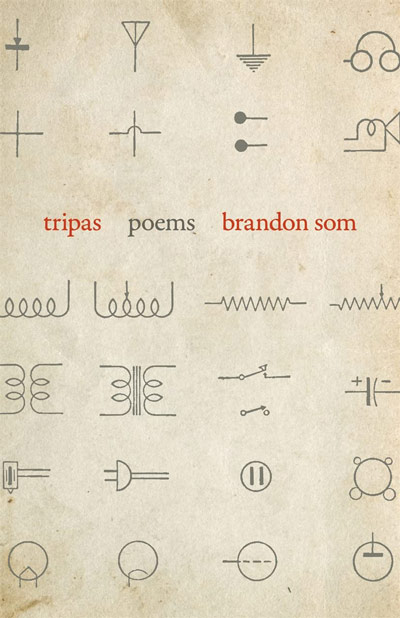UC San Diego Professor Wins 2024 Pulitzer Prize in Poetry
“Tripas: Poems,” chronicles the voices of Brandon Som’s Chicana and Chinese grandmothers.
Published Date
Article Content
This article originally appeared in the fall 2024 issue of UC San Diego Magazine as “Pulitzer Poet.”
Over a decade ago, Brandon Som, associate professor of literature, took the ferry to Angel Island in San Francisco Bay. In the 1900s, this port of entry saw nearly a million Chinese immigrants enter the U.S. He was searching for clues about his paternal grandfather’s journey from China to the U.S. This investigation resulted in invaluable insights that led to his first book of poetry in 2014, “The Tribute Horse.”
Som continued to explore and honor his family heritage through his collection “Tripas: Poems,” which was awarded the Pulitzer Prize in poetry in 2024. This time, he examined his multifaceted identity by writing about his grandmothers and their legacy of labor in Phoenix, Arizona. Nana Pastora, his Chicana maternal grandmother, worked for three decades on the Motorola factory line, and Ng Ng, his Chinese paternal grandmother, helped manage the family’s corner store.
Som learned he had won the Pulitzer Prize via a congratulatory text after landing from a flight. “It was a huge surprise,” says Som. “I am honored and deeply grateful.”
“Tripas: Poems” spans multiple languages that spark interesting juxtapositions in meaning. “‘Tripas’ celebrates my family, their labor and the intersections of Latinx and Asian American identities and cultures,” he says.
“I am not fluent in either of my heritage languages, but I am connected — I am made from — the sounds, tones, expressions, perspectives, ways of seeing and being within my family’s languages,” he explains. “‘Tripas, and poetry in general, is a way for me to trace those connections and celebrate a multilingual experience.”
Many of the works in “Tripas: Poems” were written via collaboration between Som and his family members, stemming from stories shared in conversation. In particular, the act of translation by his Chicana grandmother stirred up memories, offering a kind of telephone between cultures. He calls this practice “cómo se dice poetics.”
“Calling my nana and asking, ‘How do you say this in Spanish’ — even the most everyday words: ‘Cómo se dice “peach”?’ ‘Durazno.’ ‘Cómo se dice “eyelash”?’ ‘Pestaña’ — would lead to stories and memories,” shares Som.
These dialogues were about more than just a simple translation. “Language is relational,” he explains. “‘How do you say’ is also the difficult work of writing — how to speak truth to power, how to talk about things that are challenging and traumatic, how to find the words, how to find the form for what has been unsaid, unnamable and perhaps even unsayable.”
As a faculty member in the Department of Literature at the School of Arts and Humanities, Som’s research focuses on human rights, labor injustice and environmental racism — each a major factor in the decisions of millions each year to uproot their lives in search of freedom, opportunity and safety. He seeks to elevate the narratives of those who have been overshadowed or erased, particularly among transnational communities.
“I am not fluent in either of my heritage languages, but I am connected — I am made from — the sounds, tones, expressions, perspectives, ways of seeing and being within my family’s languages.”

Since joining UC San Diego in 2016, he has presented a multitude of opportunities for students to study cultural differences. For example, his Intercultural Writing Workshop invites students to explore how Black, Indigenous, Latinx and Asian American writers reclaim cultural traditions, heritages and vernaculars and transform them into innovative, engaging verse.
The approach has been successful. One student explained that Som’s Intercultural Poetry class changed their future path as an educator and writer: “This was the first time in my academic career I had read pieces written by Latinx authors in a classroom setting (as a Latinx student). Many of us came from bilingual households and were finally given a safe space to pursue this in our writing.”
At the core of his own creative writing practice is the unraveling of self and recognition of the interconnectedness of cultures. And this is what he hopes to inspire in his students.
You May Also Like
Stay in the Know
Keep up with all the latest from UC San Diego. Subscribe to the newsletter today.





